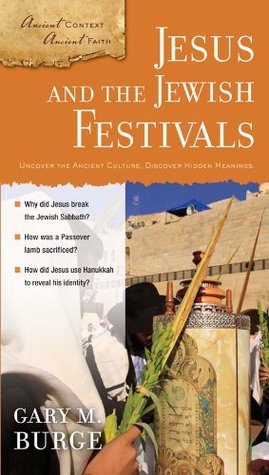Kindle Notes & Highlights
Read between
September 15 - September 18, 2017
Hanukkah is a Hebrew word for “dedication,” and it became the name of the winter festival in Jerusalem that remembered these events.
Note how Judas “dedicated” the cleansed temple. This “Festival of Dedication” celebrated the rededication of the temple in 164 BC after its defilement.
Ezekiel 34 was central to every Hanukkah discussion.
For him, sincere shepherding meant nurturing, guiding, and knowing the sheep in a manner that was as intimate as it was heroic.
Remember how Hanukkah (or Dedication) recalled the cleansing and rededication of the temple. The
Here Jesus claimed that he had been “set apart” or “made holy” or “consecrated” (Gk. hagiazô).
It is no accident that John’s gospel again and again eagerly compares Jesus with the temple (1:14; 2:31). Here at Hanukkah a new temple, consecrated by God, had appeared.
John’s gospel records three Passover visits: John 2:13 – 25; John 6; and John 13 – 19.
The “spurting” blood from the lamb was one verification that life was being sacrificed for life.
If we expect that twenty people might consume the lamb and if 100,000 people were in Jerusalem, that meant that five thousand lambs were slain on Nisan 14.
According to other estimates, if Jerusalem had a population of 100,000 and ten persons slaughtered one lamb, then ...
This highlight has been truncated due to consecutive passage length restrictions.
At Passover, however, not everyone could participate that day in the offering of the lamb. Therefore it was understood: those who ate the meat of the sacrificial victim shared in the benefits of its death.
In a sacrificial meal, he was now providing a new sacrifice, a Passover sacrifice, and his life was going to be a new lamb killed during this day of sacrifice.
Is Jesus that struck rock? Paul delights in comparing Jesus to that rock (1 Cor. 10:4), and a later Jewish tradition (which we cannot date) says more: Moses struck the rock twice according to Numbers 20, once it flowed blood, the second time water.
In this sense, the church lives within Passover, continually celebrating the meal that lives at the center of its worship and anticipating the moment when we join Christ in heaven and drink the final cup—the cup of praise and rejoicing, the Hallel cup—with him.
Israel was rescued from Egypt (Passover, Pesach), Israel met God at Mount Sinai (Pentecost, Shavuot), and then Israel wandered in the wilderness (Tabernacles, Sukkoth).
But the agricultural cycles were in play as well: the start of the springtime cereal harvest (Pesach), the end of the cereal harvest along with sifting and milling (Shavuot), and the harvest of tree and vine (Sukkoth).
“Paul had decided to sail past Ephesus to avoid spending time in the province of Asia, for he was in a hurry to reach Jerusalem, if possible, by the day of Pentecost” (Acts 20:16). Paul also tells the Corinthians that he will “stay on at Ephesus until Pentecost” (1 Cor. 16:8). This is Paul thinking like a Jew, marking time with a common festival.
Pentecost was also called the Feast of Weeks, or in some cases the Day of Firstfruits (Heb. Yom Habikkurim). Since
This is fascinating to Christians because of one connection. If the Jewish feast of Pentecost was emerging in New Testament times as the occasion to recall the birth of Israel’s covenant life under the law, for the church Pentecost became the day on which to recall the birth of the church under the power of the Spirit.
As Israel was “born” on Pentecost, so too the church was “born” on Pentecost, inasmuch as it received the endowment that would empower its ongoing life.
It was the only time in the Hebrew Scriptures where God’s people were called to fast. On the evening following Tishri 9, all Israel wherever they lived were called on to fast, think of their sins, and seek God for forgiveness.
Josephus (J.W. 5:219) and the Mishnah (Yoma 5:2) tell us that the Most Holy Place was empty since no doubt the ark had never been recovered following the Babylonian exile.
When Jewish and Gentile Christians first worked out their differences in Acts 15, not even James included Sabbath-keeping as one of his expectations for Gentile faithfulness.
It isn’t until about seventy years after the death of Christ that Christians began thinking theologically about Sunday gatherings in earnest.
A bishop in Syria, Ignatius of Antioch, lived in the late first century as well and wrote the same things, even criticizing Sabbath observance as “antiquated” and arguing that keeping “the Lord’s Day” is valuable because it celebrates Christ’s resurrection through which Christians find life (Ignatius, Letter to the Magnesians 9:1).
No doubt by AD 100 or at the latest 150, Christians had come to a consensus that the distinguishing marker of Christian life and worship was Sunday and that Sabbath observance was to be left behind with the many other Jewish festivals also listed in the Scriptures.
Thus we do not worship God with a Passover Meal; we worship him with the Lord’s Supper (or Eucharist) that is anchored to Passover but moves beyond it definitively. We do not celebrate an Egyptian lamb that was slain to protect God’s people; rather, we announce the Lamb of God who takes away the sins of the world.


